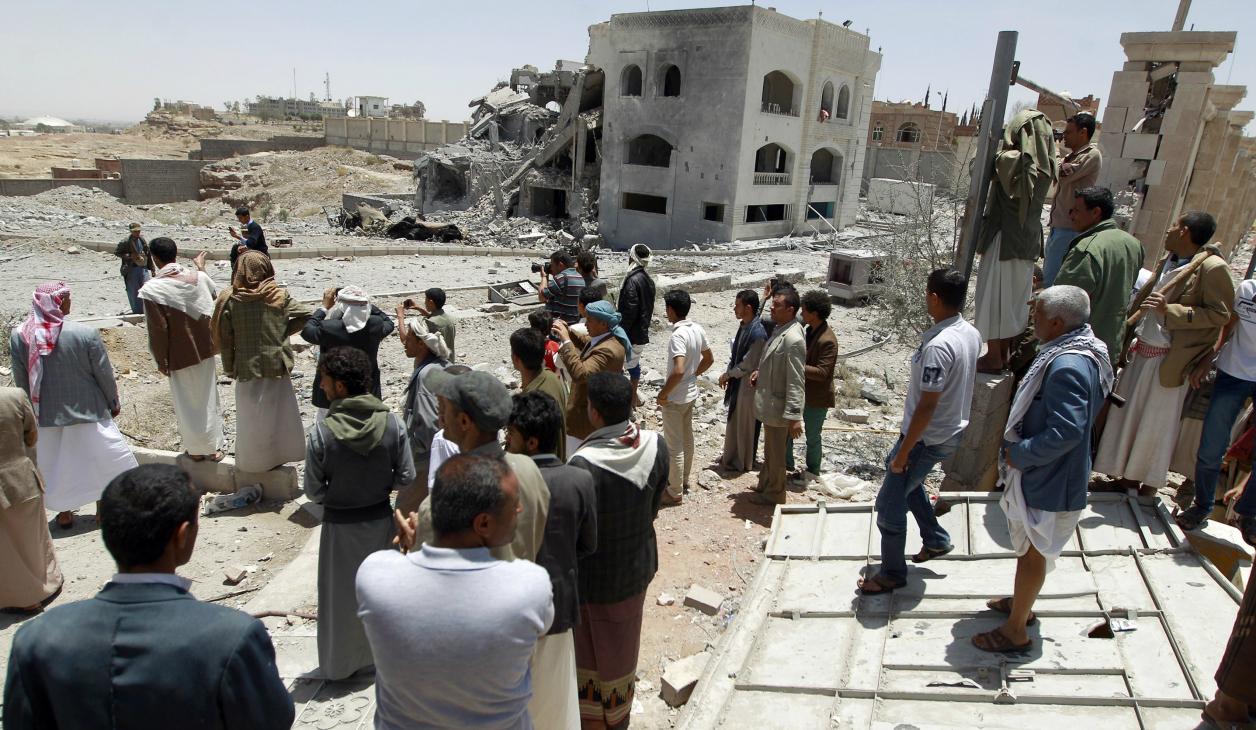Saudi-led coalition intensifies bombing in Yemen
Yemenis gather in the yard of Abdullah Yahya al-Hakim, the military commander of the Shiite-Houthi militant group, after an air strike destroyed his property in Sanaa on April 28, 2015.
Saudi-led coalition warplanes intensified raids on Yemen's capital Wednesday, as Washington confirmed a top US diplomat had met representatives of Iran-backed rebels to try to revive proposed Geneva peace talks.
The UN Security Council appealed for a new humanitarian ceasefire and peace talks as soon as possible to end fighting that has killed at least 2,000 people since March.
The 15-member council, backing an appeal by UN chief Ban Ki-moon, said in a unanimous statement it was "deeply disappointed" that the planned May 28 talks in Geneva had been put off.
Sunni-ruled Saudi Arabia and its regional allies have been bombing the rebels since late March to try to restore exiled President Abed Rabbo Mansour Hadi to power.
Dozens of explosions rocked the capital as coalition jets pounded Sanaa for hours from early Wednesday, an AFP correspondent said.
The raids targeted several rebel arms depots, a pro-rebel military police camp and a renegade troop base, residents said.
The bombing shook nearby buildings and sent flames shooting into the air as debris rained down on houses in the area.
At least three people were killed and 11 wounded in the raids and subsequent explosions, a medical source said.
The coalition also struck positions in the northern provinces of Jawf, Saada and Hajja near the Saudi border, as well as in the third city of Taez and the southern province of Daleh.
Meanwhile, southern fighters allied with Hadi said 32 Houthi rebels were killed in air raids and battles in the port city of Aden.
"They left their dead on the ground and fled," said Ali al-Ahmedi, spokesman of the Popular Resistance leadership, talking of confrontations in Mansoura district.
AFP could not verify this death toll with the Houthis or an independent source.
The Huthis have allied with renegade troops loyal to former president Ali Abdullah Saleh, who ruled Yemen for three decades before stepping down in 2012 after a year-long uprising.
Need for political solution
Washington said Tuesday that Assistant Secretary of State for Near Eastern Affairs Anne Patterson had met Huthi rebel representatives in neighboring Oman to try to persuade them to take part in the proposed Geneva conference.
The Oman meeting aimed to "reinforce our view that there can only be a political solution to the conflict in Yemen and that all parties including the Houthi" should participate in the UN-led political process, State Department spokeswoman Marie Harf said.
The Geneva conference was postponed days before it was due to start, after the UN failed to persuade the warring parties to attend.
Patterson also traveled to Saudi Arabia for talks with the kingdom's leaders as well as Hadi, who fled Yemen earlier this year as the rebels tightened their grip on much of the war-wracked country.
As diplomatic efforts gathered pace, UN envoy Ismail Ould Cheikh Ahmed met with Hadi this week after traveling to rebel-held Sanaa for talks there.
A five-day ceasefire last month allowed aid agencies to reach civilians caught in the fighting, but UN efforts to prolong the truce failed.
A diplomat said that an announcement on a new date for the talks, possibly around June 10, was expected soon.
A spokesman for Hadi's internationally recognized government, Rajeh Badi, said Tuesday that efforts were underway to hold the meeting "within two weeks."
But he said there was "no talk" of a truce between the Houthis and the Saudi-led coalition.
The government is insisting that the rebels relinquish seized territory and weapons before it will attend.
A diplomat in Oman said the Houthis had told the United States they want a halt to the bombing and uninterrupted access for deliveries of humanitarian aid.
The United Nations has called for the talks to be held without preconditions.
Security expert Mustafa Alani said Washington could not offer any deal that does not adhere to UN Security Council Resolution 2216, which calls for Houthi withdrawal from seized territories and surrendering weapons they took from the army.
"Saudi Arabia is hanging onto the 2216 decision and puts its implementation as a condition for a truce," he said.
The Oman meetings followed a visit to Muscat last week by the foreign minister of Shiite Iran, Saudi Arabia's regional rival.
Tehran is seen as a key backer of the Houthis but has denied shipping weapons to them.
Muscat has good ties with both Iran and Washington, and has often played the role of mediator.
It is also the only member of the six-nation Gulf Cooperation Council, in which Saudi Arabia is a major force, not to have joined the coalition against the Houthis.
We want to hear your feedback so we can keep improving our website, theworld.org. Please fill out this quick survey and let us know your thoughts (your answers will be anonymous). Thanks for your time!
